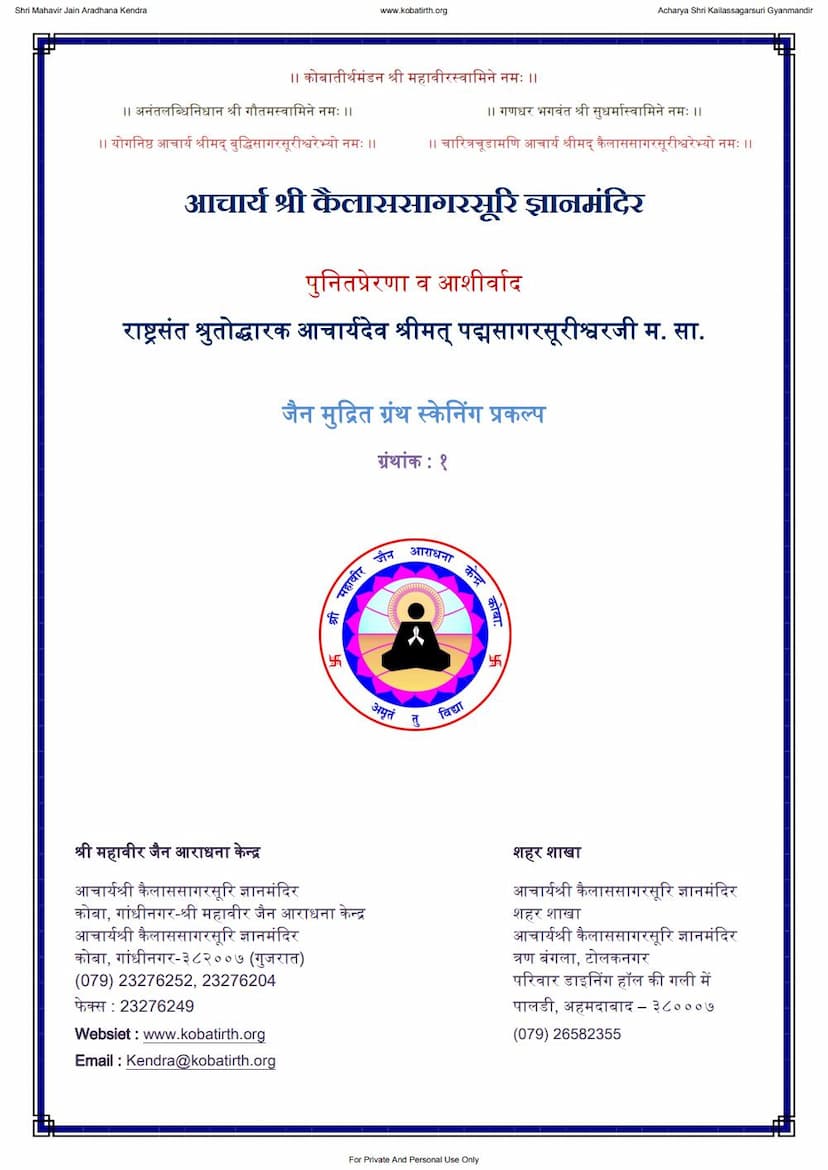Charak Samhita
Added to library: September 1, 2025

Summary
The provided text is a Jain-authored commentary or explanation related to the Charaka Samhita, a foundational Ayurvedic text. The text, originating from the Shri Mahavir Jain Aradhana Kendra, focuses on the Sutra Sthana (Systematic Section) and specifically the Dirgha Jivitiya Adhyaya (Chapter on Long Life).
Here's a summary of the key themes and discussions present in the text:
-
Invocation and Reverence: The text begins with invocations to Jain deities and revered Acharyas, including Shri Mahavir Swami, Shri Gautam Swami, Shri Sudharma Swami, and Acharya Shri Kailassagarsuri. This highlights the Jain philosophical perspective underpinning the commentary.
-
The Nature of Ayurveda and Charaka Samhita: The commentary emphasizes Ayurveda as a "Kalpadruma" (wish-fulfilling tree) of all knowledge, contributing to both worldly well-being and ultimate liberation (Moksha). It positions the Charaka Samhita as a highly revered and comprehensive treatise, illuminated by the commentary of Gangadhara Kaviratna.
-
Purpose of the Text: The author clarifies the purpose of the commentary, which is to elucidate the Charaka Samhita, particularly the chapter on long life. This chapter is deemed primary due to its focus on the means to achieve longevity, a crucial aspect of human well-being.
-
Etymological and Philosophical Explanations: The text delves into the meaning of key Sanskrit terms like "Atha" (auspicious beginning, hence auspiciousness) and "Ataḥ" (from this, indicating a sequence or consequence). It connects these terms to philosophical concepts like the pursuit of liberation, detachment, discrimination between reality and unreality, and the importance of health and long life as prerequisites for spiritual progress.
-
The Origin and Transmission of Ayurveda: A significant portion of the text traces the lineage of Ayurvedic knowledge, starting from Brahma, through Prajapati, the Ashwini Kumaras, Indra (Shakra), and ultimately to the sages, including Bharadvaja. This emphasizes the divine and ancient origins of this medical science. The story of Bharadvaja seeking knowledge from Indra highlights the importance of seeking knowledge from qualified sources.
-
The Concept of Long Life (Dirgha Jivita): The chapter begins by defining the significance of long life as a means to achieve ultimate goals. It discusses the factors contributing to longevity and the reasons for diseases and short life.
-
The Role of the Physician and Knowledge: The text underscores the importance of a physician's knowledge, wisdom, and compassionate approach. It stresses that true medical knowledge (Ayurveda) is about promoting health in the healthy and curing illness in the unhealthy.
-
Philosophical Underpinnings (Sankhya and Vaisheshika): The commentary engages with concepts from prominent Indian philosophical schools like Sankhya and Vaisheshika, discussing the nature of reality, substances (dravyas), qualities (gunas), actions (karmas), and the concept of inherence (samavaya). It aims to integrate these philosophical viewpoints within the Ayurvedic framework.
-
The Six Categories (Padarthas) and their Significance: The text extensively discusses the six categories: substance (dravya), quality (guna), action (karma), generality (samanya), particularity (vishesha), and inherence (samavaya). It explains how understanding these categories is crucial for comprehending the causes of health and disease and the principles of treatment.
-
The Importance of Diet and Lifestyle: While not explicitly detailed in the excerpted pages, the underlying theme of achieving long and healthy life points towards the importance of balanced diet, lifestyle, and adherence to prescribed regimens, which are central to Ayurveda.
-
The Role of the Physician's Conduct: The text implicitly emphasizes the ethical conduct and profound knowledge required of a physician, highlighting that even potent medicines can be harmful if misused, and ignorance can be more dangerous than poison.
In essence, this Jain commentary on the Charaka Samhita's initial chapter serves as a philosophical and theological lens through which the principles of Ayurveda are viewed. It emphasizes the divine origin, the importance of correct knowledge, the interconnectedness of health, and the ultimate goal of liberation, all within a Jain spiritual framework.